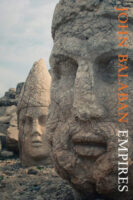The World at Large
Guest Post by Michael Hettich.
John Balaban is one of the finest poets of his generation, and indeed one of the best poets at work today. When I say “fine,” I mean just that: his poetry communicates a discernment of eye and ear attuned to nuance, subtle variation, and the truths embedded therein. These qualities, coupled with a rare intelligence, a deeply-informed worldview, and a resistance to navel-gazing or rhetorical pomposity, combine to invest his work with a Classical tenor that has the clarity of good prose and the heft of well-made poetry. As with all of his previous books of poetry and prose, his new book, Empires, is an engaging, invigorating, expertly-crafted collection that manages to speak simultaneously to and of our time as well as of the great span of history that has brought us to this moment.
Balaban’s widely-admired body of work includes seven previous books of his own poetry, translations from the Vietnamese, works of fiction, and works of nonfiction and memoir. Remembering Heaven’s Face (1991), his memoir of serving as a conscientious objector working for the International Voluntary Services in Vietnam during that war, has been called “one of the most beautifully-written books ever published about Vietnam.” Of Locusts at the Edge of Summer, his selected poems (1997), Maxine Kumin said, “Balaban seems to me to be our moral spokesperson, our lyricist, exhorter, and consoler: in short, the poet we need.” These words apply equally to his new book.
Here his wide-reaching worldview is matched by an equally capacious empathy that refuses to flinch, dissemble, or turn to idiosyncratic rumination. As in his earlier work, Balaban is acutely aware of the extent to which our present is determined by the past, and as such his unadorned, carefully-crafted poems present a larger and more incisive, politically-informed worldview than most poets of our time—politically-engaged or not—can pretend to. In this he strikes me as a uniquely prescient and important voice. Here, in the opening lines of the opening poem in the book, the immediate aftermath of 9/11 feels eerily predictive of our particular moment, some twenty years hence:
After most of the bodies were hauled away
and while the FBI and Fire Department and NYPD
were still haggling about who was in charge, as smoke cleared,
the figures in Tyvek suits came, gloved, gowned, masked,
ghostly figures searching rubble for pieces of people,
bagging, then sending the separate and commingled remains
to the temporary morgue set up on site.
This is where the snip of forefinger began its journey.
(“A Finger”)
Adding further nuance and depth to this book’s overall thematic arc, Balaban has included several expertly-rendered translations of the 20th century Romanian poets Benjamin Fondane and Stefan Augustin Doinas. Fondane, a poet and philosopher who occasionally wrote under the name Fundoianu, perished in Auschwitz in 1944. Balaban’s translation of what is probably his final poem, “Preface En Prose,” forms one of the thematic and emotional centers of this book:
Like you I read all the newspapers, the books,
and understood nothing of the world,
understood nothing about men,
though often I may have claimed to.
When death, when death came, perhaps
I pretended to understand but, really . . .
when all of death entered my astonished eyes
I was stunned by how little I had understood.
Central to the power of this deftly-edited and carefully sequenced book is the aforementioned Classical clarity and exactness in Babalan’s lines and verse forms. Even in his most intimate, tenderhearted poems, the writing is almost self-effacing in its poise and balance, well-wrought and clear. Balaban’s gaze turns always outward. Wherever he looks and whatever he writes about, he is ever-aware of the moral implications embedded in history and in the way we respond to what we understand—or refuse to understand—of that history. This is poetry of high craft and artistry, work that will last—and in doing so, communicate to future readers that perhaps ours wasn’t wholly an age of barbarians.
Empires by John Balaban. Copper Canyon Press, 2019.
Reviewer bio: Michael Hettich’s most recent book of poems is To Start an Orchard (2019). A new book, The Mica Mine, won The Lena Shull Book Award and is forthcoming in 2021. His website is michaelhettich.com.





